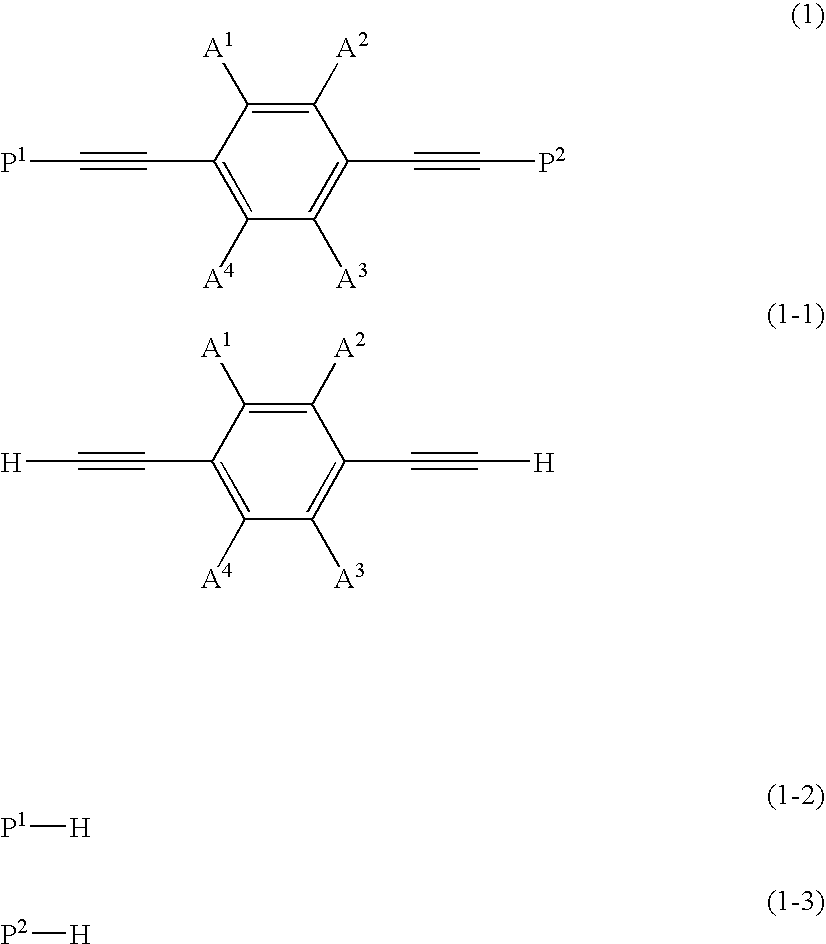Compound having phenylacetylene structure, liquid crystal composition, polymer, optically anisotropic product, optical or liquid crystal element, dibenzothiophene compound, intermediate, and process for producing the same
a technology of phenylacetylene and compound, which is applied in the field of compound having phenylacetylene structure, can solve the problems of undesirable coloring of compound, insufficient refractive index anisotropy, and insufficient size, and achieves the effects of large refractive index anisotropy, convenient mixing with other liquids, and advantageous light resistan
- Summary
- Abstract
- Description
- Claims
- Application Information
AI Technical Summary
Benefits of technology
Problems solved by technology
Method used
Image
Examples
example 1-1
According to the process disclosed in J.Am.Chem.Soc., 1951,73,5887, 3-bromodibenzothiophene was synthesized. A flask equipped with a stirrer and a thermometer was charged with 44.1 g of the thus synthesized 3-bromodibenzothiophene and 441 g of carbon tetrachloride in a nitrogen atmosphere, and cooled to −5° C. The mixture was bubbled with a chlorine gas under stirring at −7° C. to −12° C. for 5 hours. The reaction mass was poured into 1000 g of ice water, and stirred at or below 5° C. for 40 minutes. The reactant was filtered and washed with carbon tetrachloride. The resulting crystals were dried to obtain 27.91 g of 3-bromodibenzothiophene-5-oxide. The product was subjected to elemental analysis, the results of which are as follows:
Elemental Analysis: C12H7BrOS (Theoretical(%): C=51.63, H=2.53; Observed(%): C=51.59, H=2.58)
example 1-2
A flask equipped with a stirrer and a thermometer was charged with 69.8 g of glacial acetic acid and 27.9 g of 3-bromodibenzothiophene-5-oxide prepared in Example 1-1 in a nitrogen atmosphere, and cooled to 10° C. 239.8 g of concentrated sulfuric acid was added dropwise, and the resulting mixture was cooled to −2° C. Then 72.0 g of 70 wt % nitric acid was added dropwise at −2 to 8° C., and the resulting mixture was stirred at or below 5° C. for 2 hours. The reaction mass was poured into 1200 g of ice water to terminate the reaction, and stirred further. The reactant was filtered, washed with water, and dried. The resulting dry cake was washed with ethanol to obtain 31.9 g of 3-bromo-7-nitrodibenzothiophene-5-oxide. The product was subjected to elemental analysis, the results of which are as follows:
Elemental Analysis: C12H6BrNO3S (Theoretical(%): C=44.46, H=1.87; Observed(%): C=44.42, H=1.84)
example 1-3
A flask equipped with a stirrer and a thermometer was charged with 26.98 g of the intermediate 3-bromo-7-nitrodibenzothiophene-5-oxide prepared in Example 1-2 and 269.8 g of glacial acetic acid in a nitrogen atmosphere. 112.7 g of SnCl2.2H2O dissolved in 158 g of concentrated hydrochloric acid was added dropwise at 14 to 18° C. over 1 hour, and stirred overnight at room temperature. The resulting reactant was filtered, washed with 1:1 glacial acetic acid / concentrated hydrochloric acid, and neutralized with 1100 g of a 7 wt % aqueous solution of sodium hydroxide. The reactant was extracted with ethyl acetate, washed with water, concentrated, and purified by silica gel chromatography using 1:1 hexane / chloroform mixed with 0.1 wt % triethylamine as an eluting solvent, to thereby obtain 17.31 g of objective 7-bromodibenzothiophene-3-yl-amine. The product was subjected to elemental analysis, the results of which are as follows:
Elemental Analysis: C12H8BrNS (Theoretical(%): C=51.81, H=2.9...
PUM
| Property | Measurement | Unit |
|---|---|---|
| crystal composition | aaaaa | aaaaa |
| liquid crystal composition | aaaaa | aaaaa |
| brightness | aaaaa | aaaaa |
Abstract
Description
Claims
Application Information
 Login to View More
Login to View More - R&D
- Intellectual Property
- Life Sciences
- Materials
- Tech Scout
- Unparalleled Data Quality
- Higher Quality Content
- 60% Fewer Hallucinations
Browse by: Latest US Patents, China's latest patents, Technical Efficacy Thesaurus, Application Domain, Technology Topic, Popular Technical Reports.
© 2025 PatSnap. All rights reserved.Legal|Privacy policy|Modern Slavery Act Transparency Statement|Sitemap|About US| Contact US: help@patsnap.com



